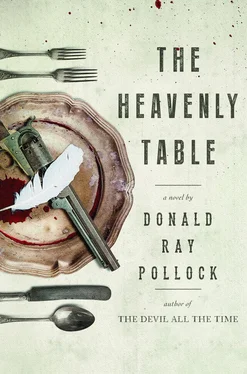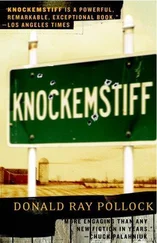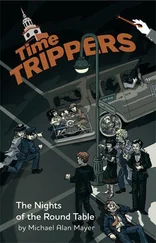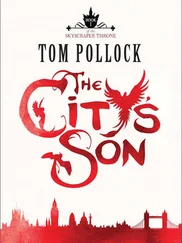An hour later, he went back into town and saw an old man sitting on a bench in front of the post office. “You ’member me?” Sugar asked.
The man examined him for a minute with yellow eyeballs, then cleared his throat. “Can’t say I do.”
“Don’t matter,” Sugar said. “Them Milfords that lived down the road there, where’d they all go off to?”
“Oh, they ain’t lived around here for several years now,” the old man said. “Not since the mother passed. I think maybe they went to Detroit. They always claimed one of their brothers was up there makin’ good money buildin’ them automobiles, but only a fool would have ever believed that shit. I knew that boy well, and he never was nothing but a liar and a blowhard. George, I think his name was. He’d brag about gettin’ up in the morning, that boy. Like he’d done something big, just by cracking his eyes open. Most worthless nigger ever come out of Shadesville, if ye ask me. I warned them others not to go, but they wouldn’t listen. Shoot, I’d say they probably all dead or locked up by now.”
Sugar scowled and turned away. So his mother was dead. It didn’t surprise him really, now that he thought of it; she could barely get out of her chair the day he’d left. He looked up and saw the cemetery on the little knob behind the grocery. Crossing the road, he found her resting place a few minutes later, a rock with her name scratched on it marking the head of it. The only store-bought stone in the entire graveyard belonged to Mrs. Hitchens, whose son, Marcel, had gone to a Negro college in Alabama and made good. Fucking stuck-up bastard, always wearing that goddamn blue tie and carrying a book under his arm. Getting down on his knees, Sugar started clearing the plot of weeds and dead leaves. He was nearly done when a great tiredness overcame him. He stretched out on the ground in the warm sunlight and closed his eyes. When he awoke several hours later, he made his way back down the hill to the grocery and bought three slices of longhorn cheese and a handful of crackers and a bottle of milk from a young girl with a rag tied around her head and a colicky baby balanced on her hip. He ate his supper out front. Across the dirt road, a group of young black men had replaced the old man on the bench in front of the post office. They were talking loudly and passing a bottle around. Bedrolls and carpetbags lay on the ground about them. Sugar finished his meal and walked over. They were from all over the county, from Fish Creek to Sourdough, and they told him they were going to join Uncle Sam’s army. A man with a wagon was supposed to pick them up in the morning and take them to Lexington.
Sugar laughed. “They ain’t gonna take no niggers in the army,” he said.
“Oh, yes, they are, boy,” a tall, heavy man with a loud, confident voice said. Sugar glanced over at him coolly. His front teeth were missing and he had no shoes, but he was wearing a new pair of bibs, and it was evident from the way he rocked back and forth on his bare heels with his thumbs hooked under the brass buttons on the shoulder straps that he thought he was hot shit. If you didn’t know better, you’d have thought he was a well-to-do land baron standing on a balcony among a bunch of his lackeys, surveying his vast holdings.
For a moment, Sugar thought about how stupid and childish the man looked. He doubted if the poor sonofabitch had fifty cents in his pocket. But then he remembered the smug way he had felt right after purchasing the bowler, and his stomach clenched up a little. King of the world for just $2.95. Christ, he was no better than this fucking clown. “Where’d you hear that?” he asked, swallowing some watery bile.
“Show him, Brownie,” the big man said.
A boy with bubbly white blisters around his mouth pulled a flyer from inside his homespun shirt and handed it over. Sugar scanned the drawing of a black man with thick lips and a broad nose dressed in a sharply creased uniform and saluting. Though it looked official, he still doubted the veracity of it. He figured someone was passing them around as a joke, like the ones he had seen in Detroit last winter promising five hundred dollars and twenty acres to any colored person over the age of eighteen who showed up at the courthouse in Fairbanks, Alaska, during the month of February. A dozen had frozen to death trying to make that journey, and several hundred more stranded before someone figured out it was all a hoax. It was just naturally assumed that some white folks were responsible, so imagine everyone’s surprise when it was discovered that a colored boy who swept up nights at a printing press was the culprit. His reason? Nobody knew. He disappeared the same night someone ratted him out, and by the time his body was discovered hanging like a side of beef in the back of a meat locker eight weeks later, it was too late to ask.
“You might as well come with us,” a voice behind him said.
Sugar passed the paper back. Just as he was getting ready to reply that, providing the poster was even legitimate in the first place, only an ass-kissing Uncle Tom would volunteer to go off and fight a war started by a bunch of rich white motherfuckers clear on the other side of the ocean, he saw one of the men tip the bottle up. “I sure could use a drink,” he said instead.
“Give him a taste, Malcolm.”
Sugar took a long pull and handed it back. He wiped his mouth just as the whiskey exploded in his belly. A warm, tingling sensation spread over his entire body, from the bottoms of his sore feet to the top of his bruised head, and he immediately wanted more. “Any place around here to get a jug?” he asked.
A squat, husky man wearing a frayed straw boater pointed across the road to a narrow, windowless hut tacked on the side of the store. “Jenksie over there will fix you up if’n you got the money,” he said.
“You ain’t from around here, are ye?” another asked.
“No,” Sugar replied, “I’m comin’ from Detroit.”
“Detroit? What you doin’ in Shadesville then?”
“Oh, I just stopped by to see some people, but they all gone.”
“What people?”
“The Milfords.”
“The Milfords? Why, that was ol’ Susie’s name, wasn’t it?” Several of them chuckled.
“Lord, I damn near forgot about her,” another said.
“Not me,” a light-skinned boy with greenish eyes said. “That girl could suck a—”
“That’s my sister you’re talkin’ about,” Sugar said, raising his voice and placing his hand on the razor in his pocket.
“Oh,” the boy said.
“Well,” said another.
They all looked away or down at the ground for a minute, then someone said, “Here ye go,” and handed Sugar the bottle again. He forgot about his sister and stayed with them for a while longer, but they didn’t pass their liquor around fast enough to suit him. Walking over to the little shed, he tapped on the door and a sweaty, sickly-looking man wearing nothing but a soiled pair of yellow trousers let him in. The man sat down on a wooden crate before he asked Sugar what he wanted. It was dark inside the room. There was something alive inside the crate, moving around in a tight circle, but Sugar couldn’t make out what it was. He bought a couple of pints of Old Rose and that left him with a dollar. Avoiding the volunteers, he sneaked around the corner and down the road to his homeplace and sat under a dead apple tree in the backyard. From time to time, he uncapped one of the bottles and took a sip, then screwed the cap back on tightly. He felt guilty about breaking his promise to the Lord, who had obviously saved him once again, this time from drowning back there at the bridge, but he swore that he would never get drunk again, not after this one last time. Who could blame him really? Coming all the way back here just to find his mother dead, and his brothers and sisters gone. What the hell was he going to do now?
Читать дальше












